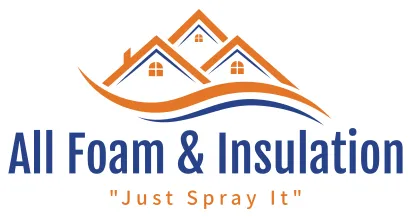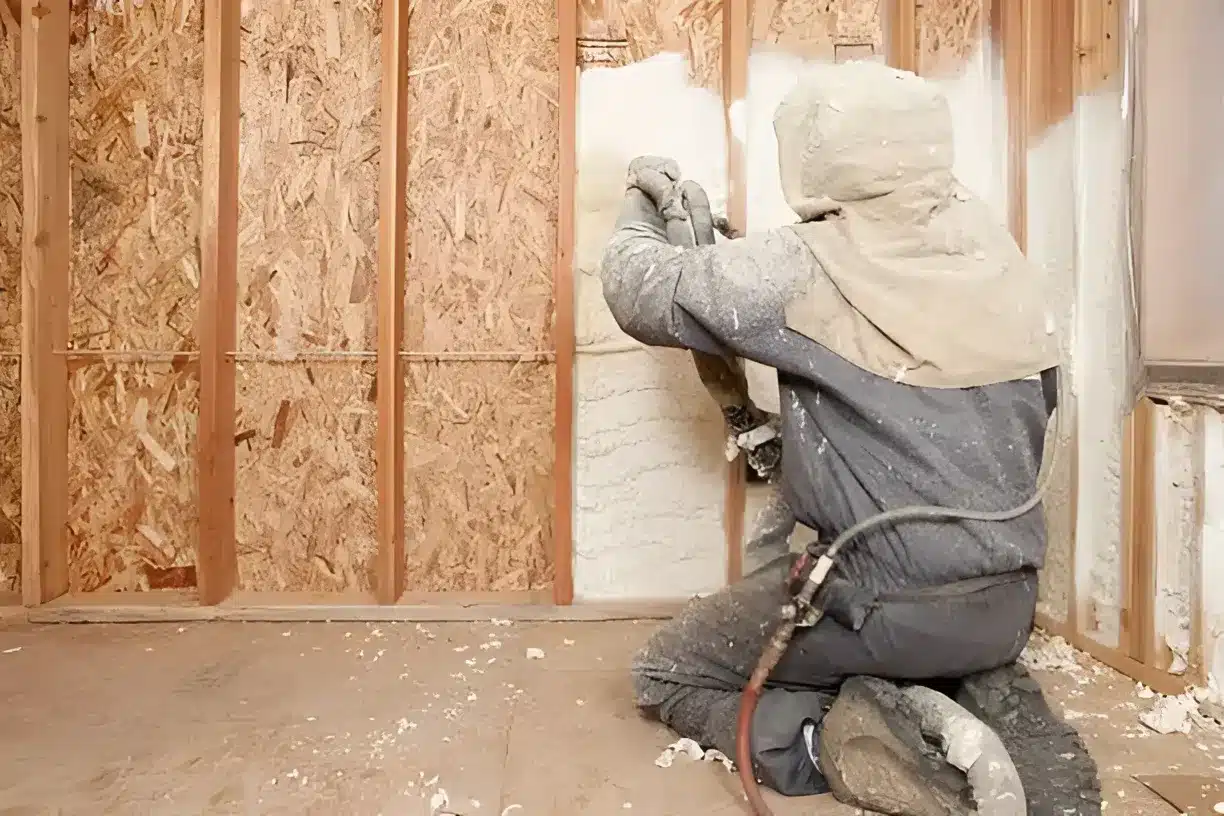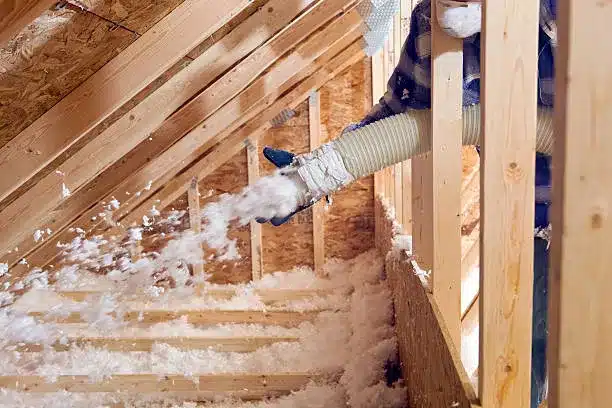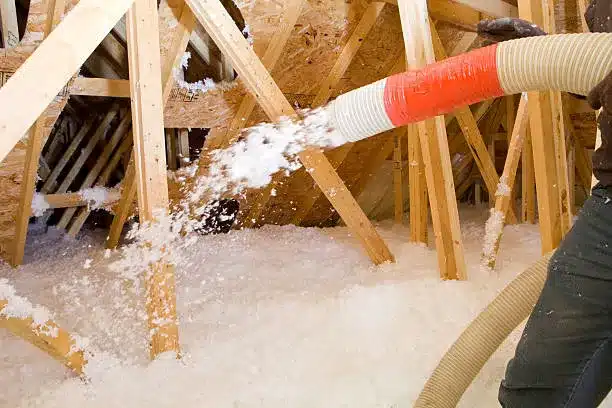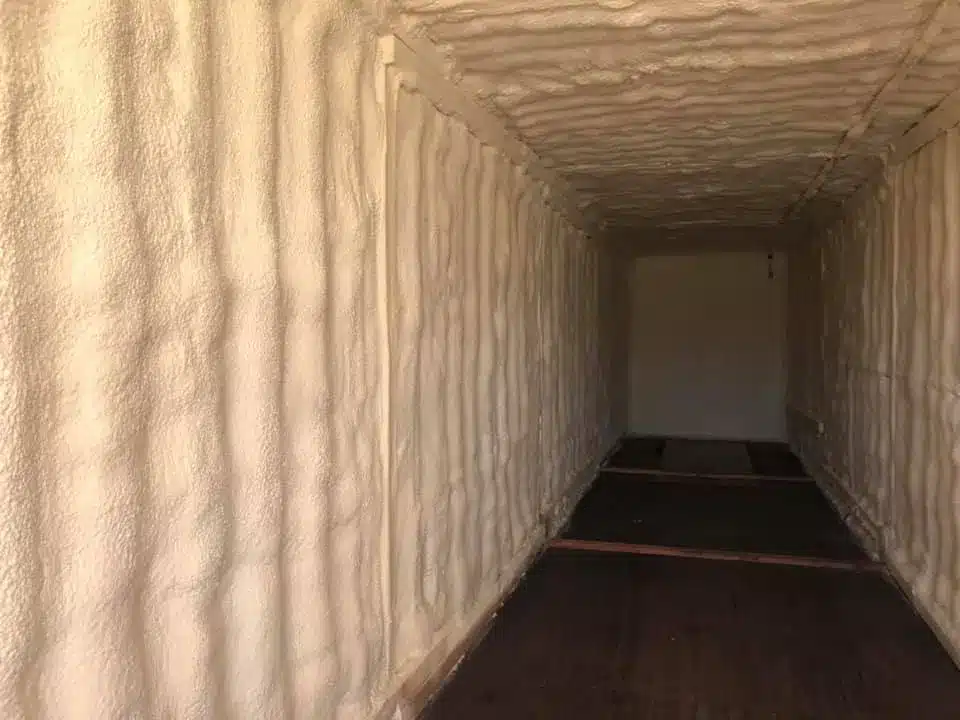For Medford’s Mediterranean climate with hot, dry summers and cold, wet winters, closed-cell spray foam insulation performs best overall due to its superior moisture resistance and high thermal efficiency. Open-cell spray foam and high-density fiberglass also work effectively, though each serves different applications based on specific location needs within the structure.
Medford’s unique climate presents specific challenges requiring careful insulation selection. The region experiences temperatures ranging from 32°F to 93°F throughout the year, with an average of 20 inches of rain annually and occasional light snowfall. This temperature variation and moisture exposure demand insulation materials that maintain performance across diverse conditions while providing adequate thermal resistance.
Understanding Medford’s Climate Demands
Medford follows the Csb Köppen climate classification, indicating a Mediterranean climate with warm summers. The region experiences distinct seasonal patterns that directly impact insulation requirements. Winter months bring substantial rainfall and humidity levels reaching 83%, while summer conditions feature dry heat with humidity dropping to approximately 45%.
These conditions create specific performance requirements for insulation materials. The wet winter months require materials with excellent moisture resistance to prevent degradation and maintain thermal performance. Meanwhile, the hot summer conditions demand effective heat resistance to minimize cooling loads.
Insulation Performance Comparison for Medford Conditions
| Insulation Type | R-Value per Inch | Moisture Resistance | Temperature Stability | Best Application |
|---|---|---|---|---|
| Closed-Cell Spray Foam | R-6.0 to R-7.0 | Excellent | Superior | Basements, crawl spaces, exterior walls |
| Open-Cell Spray Foam | R-3.5 to R-4.0 | Good | Good | Interior walls, attics with vapor barriers |
| Fiberglass Batt | R-3.1 to R-3.7 | Fair | Good | Standard wall cavities, budget applications |
| Blown-In Insulation | R-3.2 to R-3.8 | Good | Good | Existing walls, irregular spaces |
| Membrane Roofing | Varies | Excellent | Excellent | Flat roof applications |
Bonus Tip: When installing any insulation in Medford’s climate, always ensure proper vapor barrier placement. In this region, vapor barriers should be installed on the warm side of the insulation during winter months to prevent moisture accumulation.
Regional Code Requirements and Specifications
Medford falls within IECC Climate Zone 4, which establishes specific minimum insulation requirements for optimal energy efficiency. Zone 4 requires ceiling insulation with R-38 minimum values, wall insulation at R-13 for wood frame construction, and floor insulation at R-19.
| Building Component | Minimum R-Value | Recommended R-Value | Notes |
|---|---|---|---|
| Ceiling/Attic | R-38 | R-49 to R-60 | Higher values improve summer cooling efficiency |
| Exterior Walls | R-13 | R-20 with continuous insulation | Consider thermal bridging reduction |
| Floors | R-19 | R-25 to R-30 | Critical for basement and crawl space applications |
| Basement Walls | R-10 | R-15 continuous or R-19 cavity | Moisture management essential |
These requirements represent minimum standards, though exceeding them often provides better long-term performance and energy savings in Medford’s variable climate conditions.
Material Selection Strategies
The effectiveness of insulation in Medford depends heavily on proper material selection for specific applications. Closed-cell spray foam excels in moisture-prone areas such as basements and crawl spaces due to its vapor barrier properties and structural integrity. This material maintains its R-value even when exposed to humidity fluctuations common during winter months.
Open-cell spray foam works effectively in interior applications where moisture control occurs through other building envelope components. Its lower density makes it suitable for sound dampening between interior walls while providing adequate thermal resistance.
Fiberglass batt insulation remains viable for standard applications when properly installed with appropriate vapor barriers. The key lies in ensuring complete cavity filling and preventing thermal bridging through framing members.
Bonus Tip: In Medford’s climate, consider the settling characteristics of blown-in insulation. The region’s temperature swings can accelerate settling, potentially reducing effectiveness over time. Plan for periodic inspection and top-up applications.
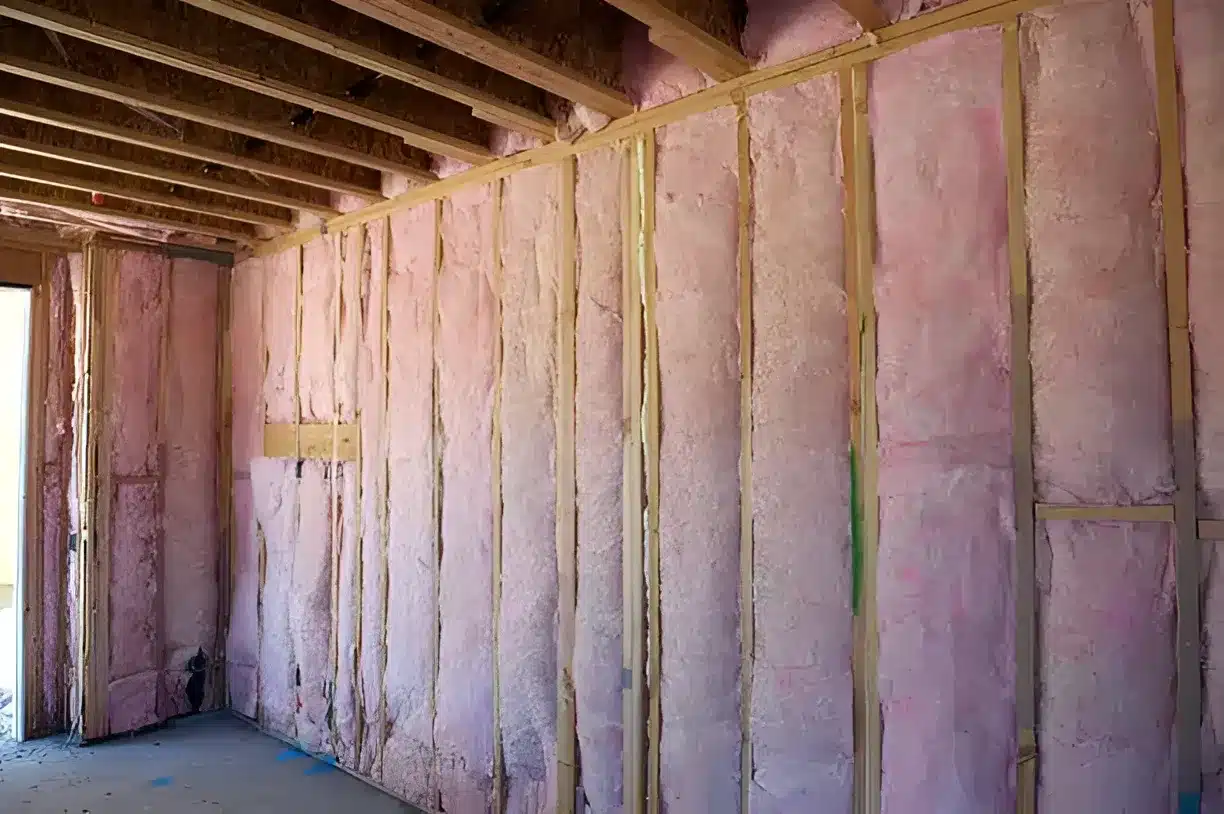
Moisture Management Considerations
Medford’s relative humidity ranges from 59% to 83% throughout the year, making moisture management critical for insulation performance. Materials must resist moisture absorption while allowing controlled drying when exposure occurs.
Closed-cell spray foam provides the most comprehensive moisture protection, functioning as both insulation and vapor barrier. This dual functionality eliminates the need for separate vapor barrier installation in many applications, reducing potential failure points.
Traditional materials like fiberglass require careful vapor barrier installation and proper ventilation design. The wet winter conditions can lead to condensation issues if moisture control measures are inadequate.
Things to Consider Before Making a Decision
Several factors influence the optimal insulation choice for Medford properties beyond basic thermal performance. Building age affects installation methods and material compatibility. Older structures may require additional air sealing measures before insulation installation to achieve optimal performance.
Budget considerations extend beyond initial material costs to include long-term energy savings and maintenance requirements. While closed-cell spray foam requires higher upfront investment, its durability and moisture resistance often provide better value over time in Medford’s challenging climate.
Existing HVAC system capacity influences insulation upgrade decisions. Significant efficiency improvements may require system adjustments to maintain proper operation and comfort levels.
Professional installation quality significantly impacts performance regardless of material selection. Poor installation can reduce effectiveness by 15-30%, negating material advantages and energy savings potential.
Professional Insulation Solutions We Provide
All Foam & Insulation, LLC delivers comprehensive insulation solutions specifically designed for Medford’s unique climate challenges. The company’s closed-cell spray foam service provides maximum moisture resistance and thermal performance for critical applications including basements, crawl spaces, and exterior walls where moisture exposure poses ongoing concerns.
Open-cell spray foam installation offers cost-effective thermal and acoustic insulation for interior applications. This service works particularly well for retrofitting existing structures where access limitations require flexible installation approaches.
Fiberglass batt insulation installation provides reliable thermal performance for standard applications when budget considerations are primary. Professional installation ensures proper fitting and vapor barrier integration for optimal long-term performance.
Blown-in insulation services effectively address existing wall cavities and irregular spaces where traditional batt installation proves challenging. This method works exceptionally well for upgrading older Medford homes without extensive renovation requirements.
Common Questions About Insulation Performance
Which insulation type handles Medford’s temperature swings best?
Closed-cell spray foam maintains consistent R-value across the widest temperature range, making it ideal for Medford’s 60+ degree annual temperature variation. Its cellular structure prevents thermal performance degradation during extreme conditions.
How does moisture affect different insulation materials?
Fiberglass and cellulose materials can lose up to 50% of their R-value when moisture content exceeds 5%. Spray foam materials maintain performance levels even with minor moisture exposure, though proper building envelope design remains essential.
What installation timing works best for Medford’s climate?
Late spring through early fall provides optimal installation conditions. Avoid installation during heavy rain periods when moisture levels could compromise material performance or installation quality.
How often should insulation be inspected or replaced?
Annual inspections help identify moisture issues or settling problems. Most properly installed insulation materials maintain effectiveness for 15-25 years, though blown-in materials may require periodic top-up applications.
Bonus Tip: Monitor indoor humidity levels during winter months. Levels consistently above 50% may indicate insulation or vapor barrier problems requiring professional assessment.
Performance Optimization Strategies
Achieving optimal insulation performance in Medford requires attention to installation details and building envelope integration. Air sealing represents the most critical factor, as gaps and cracks can reduce insulation effectiveness by 25-40% regardless of material quality.
Thermal bridging through framing members creates significant heat transfer paths that reduce overall wall system performance. Continuous insulation techniques help address this challenge, particularly in new construction or major renovation projects.
Ventilation system design must complement insulation improvements to maintain indoor air quality while preserving energy efficiency. Proper balance prevents moisture accumulation while ensuring adequate fresh air exchange.
Energy Efficiency and Long-Term Benefits
Proper insulation selection and installation in Medford’s climate typically reduces heating and cooling costs by 20-30% compared to minimal code compliance approaches. The combination of hot summers and cold winters creates year-round energy savings opportunities through effective thermal control.
Medford averages about 200 days of sunshine annually, creating significant cooling loads during summer months. High-performance insulation reduces this burden on air conditioning systems while maintaining comfort levels.
The region’s winter conditions require substantial heating energy, making insulation investments particularly valuable for reducing natural gas and electric heating costs. Proper material selection ensures these benefits persist throughout the insulation’s service life.
Making the Right Choice for Your Property
Selecting optimal insulation for Medford’s climate requires balancing performance requirements, budget constraints, and building-specific factors. The region’s temperature extremes and moisture challenges favor materials with superior thermal stability and moisture resistance, making closed-cell spray foam the premium choice for critical applications.
Consider long-term value rather than just initial costs when evaluating options. Materials that maintain performance throughout Medford’s challenging seasonal conditions provide better return on investment through consistent energy savings and reduced maintenance requirements.
Professional assessment helps identify the most cost-effective approach for individual properties. Building age, existing insulation levels, and specific problem areas influence the optimal combination of materials and installation methods.
Get Expert Insulation Solutions for Your Medford Property
Ready to improve your property’s comfort and energy efficiency with insulation designed for Medford’s unique climate challenges? All Foam & Insulation, LLC brings specialized expertise in selecting and installing the right insulation solutions for Southern Oregon’s demanding weather conditions.
Contact [email protected] or call (541) 826-9600 to schedule a comprehensive assessment of your insulation needs. Professional evaluation ensures you receive materials and installation methods specifically matched to your property’s requirements and Medford’s challenging climate conditions.
Frequently Asked Questions About Medford Insulation
What R-value should I target for maximum efficiency in Medford?
Exceeding minimum code requirements often provides better performance in Medford’s variable climate. Target R-49 to R-60 for ceilings, R-20 to R-25 for walls with continuous insulation, and R-25 to R-30 for floors. These higher values improve comfort and energy efficiency during extreme weather periods.
How does spray foam perform compared to traditional materials in wet conditions?
Closed-cell spray foam maintains 95% of its thermal performance even with minor moisture exposure, while fiberglass can lose 40-50% effectiveness when wet. The foam’s closed cellular structure prevents water absorption, making it superior for Medford’s wet winter conditions.
Can I mix different insulation types in the same structure?
Yes, combining materials often provides optimal performance and cost balance. Many Medford homes benefit from spray foam in moisture-prone areas like basements and crawl spaces, with fiberglass or blown-in materials in standard wall and ceiling applications where moisture control is less critical.
What maintenance do different insulation types require?
Spray foam requires minimal maintenance once properly installed. Fiberglass and blown-in materials need periodic inspection for settling, moisture damage, or pest intrusion. Plan for visual inspections every 2-3 years and professional assessment every 5-7 years to maintain optimal performance.
How quickly do insulation improvements pay for themselves in Medford?
Most insulation upgrades in Medford achieve payback within 3-7 years through reduced energy costs. The exact timeframe depends on current insulation levels, material choice, installation quality, and individual heating and cooling usage patterns. Higher-performance materials often provide faster payback despite higher initial costs.

